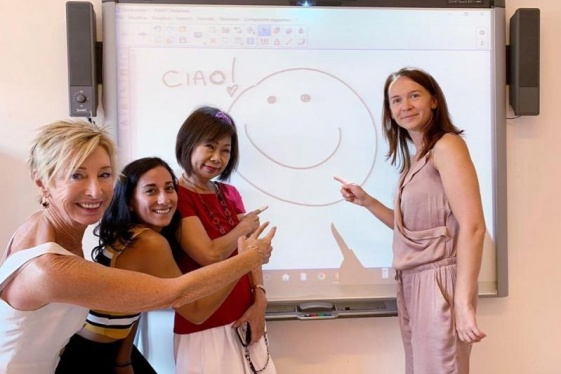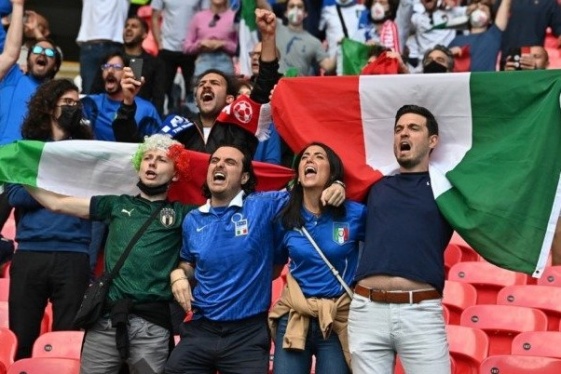

WTI Magazine #53 2015 February, 6
Author : Manuela Bianchi for learnitalygroup.com Translation by:
Let's continue to explore the vowel usage in the Italian language. We already told that Italian has 7 vowels and that they differ in four degrees of opening (open, closed, semi-closed and semi-open). Another feature that Italian has inherited from the Latin is the difference in the realization based on quantity. What does it mean?
In Latin every vowel had either a long sound and a short one, and in the passage between Latin and Italian this quantitative opposition with distinctive value has resulted in timbre opposition. In Italian, therefore, the different length of the vowels is determined by the accentual and syllabic context. A few examples: short vowels are the unstressed, the tonic ones in the monosyllables, and those in truncated words like "città" (city), the tonic ones in a closed syllable, i.e. syllables ending with a consonant such as "can-to" (singing). On the contrary, long vowels are in tonic open not final syllable (i.e. syllable ending with a vowel, in an internal position of the word, such as "ca-ne" (dog) or "ca-sa" (home).
Having such few vowels (English phonetically has 12 vowel sounds!), Italian recognizes numerous ascending and descending diphthongs. In the words "piede" (foot), "piuma" (feather), "quattro" (four), we pronounce the vowels contiguous ie-iu-ua with a single voice emission: that's a diphthong. Diphthongs are called ascending if the phonic accent falls on the second vowel such as "piéno" (full) and descending if, on the contrary, the emphasis is on the first as in "mài" (never) and "pòi" (then). A little curiosity for the more experienced: Latin also had diphthongs, in particular ae-oe-au, which later became Italian. AE>e or >ie: caelestis>"celeste" (celestial), caelum>"cielo" (sky); OE>e: poena>"pena" (pain); AU>o: paucum>"poco" (few).
But beware: for a proper decomposition into syllables, we be remember that diphthongs are part of the same syllable - i.e."pie-de" (foot) - while in other cases two vowels close one to each other in a word may belong to two different syllables. Why? In the word "aorta" (aorta) the division in syllables is a-or-ta, as well as "leone" (lion) is broken down into three syllables: le-o-ne. In these cases the pronunciation of the two vowels requires two different voice emissions (exactly the opposite of what happens in the diphthong) and thus we have what is called a hiatus. It is not always easy to distinguish a diphthong from a hiatus, but it is good to know that there is a difference.
The problem with the plural
The plural of Italian nouns remains a sore point for students of Italian language: we have daily confirmations of this in our Learnitaly schools. We have already addressed this issue by analyzing the plural of names ending in -co, -go, -cia and -gia. Now let's review in general the formation of plurals. First of all, masculine nouns ending in -a form the plural in -i: papa > papi (pope/popes) while the feminine nouns in -a form the plural in -e: rana > rane (frog/ frogs). Either masculine and feminine nouns ending in -o form the plural in –i: mano > mani (hand/hands); while masculine and feminine nouns ending in –e form the plural in –i padre > padri (father/fathers). Though, you shouldn't be surprised to know that, even in this topic, there are exceptions. In fact, the plural of the word "ala" (wing) is "ali" (wings); the plural of "arma" (weapon) is "armi" (weapons); "uomo" (man) becomes "uomini" (men) and "bue" (ox) becomes "buoi" (oxen).
Now, let's introduce few other rules. Masculine nouns ending in –io, and only when the "I" is accented, have a bizarre plural with a double final -ii: "zìo" (uncle) becomes "zii" (uncles); "leggìo" (lectern) becomes "leggii" (lecterns). However, when in the nouns ending in –io the "I" is not accented, things are different and the plural is formed with one -i: "armadio" (cabinet), with the emphasis on the second "a", becomes "armadi" (cabinets). Two more exceptions, the last ones for today: "tempio" (temple) becomes "temple" (temples), while "dio" (god) becomes "dei" (gods). It just takes a good amount of memory at the beginning, but gradually, with practice, you will assimilate the rule and the good results will come spontaneously.
You may be interested
-
Italian world language teacher 2015-2016
FRAMINGHAM PUBLIC SCHOOLS - JOB DESCRIPTION TITLE: World Language Teacher - Italian...
-
'Italy Stay Strong': What The Coronavirus Eme...
On the northern coast of Sicily, looking out toward the magnificent Aeolian Islands, Milaz...
-
‘Carnivale’ doubles as event to persuade YSU...
Lent begins next Wednesday but the Italian community of Youngstown celebrated their own Ma...
-
‘Il Canto degli Italiani’: What the Italian n...
The Italian football team and its fans are known for belting out rousing renditions of the...
-
‘In Other Words’ review: Jhumpa Lahiri’s love...
By Howard Norman Jhumpa Lahiri lived with her family in Rome in 2012. Though she...
-
‘Let’s Choose Three Words’: the Project dedic...
‘Let’s Choose Three Words’ is a new educational project promoted by the Ministry of Foreig...
-
‘Living in Rome’ talk accompanies Italian din...
An Italian Dinner and Talk on "Living in Rome: Duties, Distractions and Delights" will be...
-
‘Sons’ save Primavera program
A community program providing supplemental education in a foreign language to community ch...










